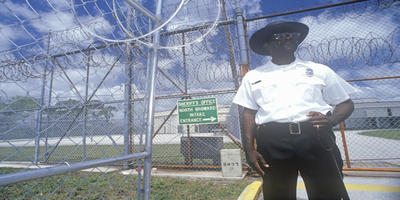Correctional Counselor
Correctional counselors help criminal offenders get on their feet and back into the real world after prison. Also referred to as correctional treatment specialists or case managers, they play a huge role in rehabilitating former inmates, providing them with counseling, and creating unique treatment plans to help former prisoners adjust to life after incarceration.
Correctional Counselor Job Description
Most correctional counselors or case managers find themselves working in parole agencies, probation offices, jails or prisons. Daily work for a correctional counselor might include holding interviews with inmates and their families, conducting psychological evaluations and designing educational or job training programs for inmates to pursue after prison.
While working with each inmate, a correctional counselor is responsible for taking detailed notes concerning the case. These notes will aid the correctional counselor in creating a unique rehabilitation plan for a particular inmate. In addition to general services, correctional counselors may also be required to provide anger management, substance abuse and/or sexual abuse counseling.
How to Become a Correctional Counselor
The job of a correctional counselor requires a cool head, positive attitude, loads of patience and, above all, compassion and a genuine desire to help inmates piece their lives together again after having spent time in prison. Educational requirements for correctional counselors vary, but, in most cases, a minimum of a bachelor’s degree in a field like criminal justice, psychology or social work is necessary. A master’s degree in the above disciplines is common as well. Most correctional counselors also undergo a one-year, on-the-job training program before they are permitted to handle cases on an independent basis.
Correctional Counselor Curriculum
To become a correctional counselor, you will need to study a variety of topics to develop a strong foundation of skills to succeed. Here are some courses that may be an essential portion of the curriculum in your program. If these courses sound interesting to you, you can find criminal justice schools on our Corrections Officer page and learn more about the curriculum of their programs.
General Psychology
General Psychology is the introductory psychology course that’s necessary for the basic understanding of the mind that every correctional counselor will need. The course is an overview of everything related to psychology. From social psychology to abnormal psychology, students will learn the basis of everything that they’ll need to know throughout their collegiate and employment career as a correctional counselor. The course also offers an overview of the history of psychological science and how the human mind behaves.
The course may seem as if its glossing over important subjects that will be necessary within the field of correctional counseling, but it’s imperative to remember that all of these subjects will be examined more deeply in future specialized courses. General psychology is a necessity for those hoping to go into correctional counseling because it lays the groundwork of everything they’ll learn related to the field of psychology. Additionally, this course is a prerequisite to all upper-level psychology courses.
Criminology and Criminal Justice
Much like the General Psychology course is a prerequisite to higher level psychology courses, Criminology is an introduction to the necessary knowledge related to the law and criminal behavior that correctional counselors will need to know to effectively perform their jobs. Students will gain a basic understanding of the criminal justice system, crime in general and law. Explores how the legal system works to keep individuals living peacefully within the social community around them. The course also delves into how the criminal justice system works in a punitive manner to discourage potential criminal acts.
Criminology will present students with a basic introduction to theories which explain why crime happens and how the legal system works proactively and reactively in dissuading criminals. Future correctional counselors will need this course if they hope to understand the major theories that they’ll learn in their upper-level courses. Additionally, it will help future correctional counselors understand what could have led inmates to commit their crimes and what can be done to prevent recidivism.
Social Psychology
The social psychology course presents an introduction to how social influences and contexts can shape an individual’s present and future behavior. It also focuses on how individuals interact with other people and within group settings. Various topics are covered throughout the student’s coursework. These topics include, but are not limited to, group processes, conformity, social perception, social cognition, obedience and interpersonal attraction. Prejudices and stereotypes are also likely to be covered.
This course provides a necessary understanding of how social contexts may influence an inmate’s behavior, so it is an essential course for those hoping to start careers in correctional counseling. This understanding will allow a correctional counselor to recognize the factors in an individual’s life which may have led them to criminal behavior. Additionally, a correctional counselor’s job includes accessing the chances that an inmate will recidivate, so being able to understand a person’s social influences and their effect on the inmate is essential.
Offender Rehabilitation
The offender rehabilitation course provides the perfect combination of psychology and criminal justice knowledge that every correctional counselor will need to effectively perform their job. It focuses on providing the student with a sound foundation in understanding correctional interventions that can help inmates effectively rehabilitate and reintegrate into normal society. It also provides theories and methods which underlie treatment programs that exist within correctional settings.
Students will learn classification systems related to various types of offenders, application and theory related to providing therapy to offenders and topics which focus on effective rehabilitation and intervention. Subjects may vary from drug treatment to reintegration techniques. This course is the holy grail when it comes to working in the correctional counseling field. Students will need this understanding if they hope to help inmates return to the outside world without re-offending. This is usually an upper-level course which students will not see until they’ve completed core psychology or criminal justice courses.
Correlates of Criminal Behavior
Course reviews the correlates of several factors, including family-level and individual, that have an effect on a person’s likelihood of engaging in criminal acts either as a child, adolescent or adult. The course goes further than simple speculation, such as the belief that video games lead to violent crime, and delve into a biopsychosocial model to understand and explain what causes criminal behavior and its sometimes persistent reemergence throughout a person’s life cycle.
Topics such as brain injuries, psychotic disorders, personality disorders, the effects of the family, substance abuse and several other psychological models are likely to be covered. This course is usually offered later in a person’s educational career and is a vital course in correctional counseling. Students will learn to recognize the catalysts to their patients’ criminal behavior. This understanding is absolutely essential in creating and implementing a solid rehabilitation plan that will actually help the offender recover and improve their life.
Correctional Counselor Salary and Career Outlook
Those interested in a career as a correctional counselor will be happy to hear that job prospects are projected to grow 3% through 2032 (Bureau of Labor Statistics, 2022). The BLS reported in 2022 that the median annual salary for correctional counselors is $59,860.
2022 US Bureau of Labor Statistics salary and employment figures contained here reflect national data, not school-specific information. Conditions in your area may vary. Data accessed November 2023.
Below, we speak with Jon Candea, Correctional Advisor at Johnson County Department of Corrections of Kansas, about his career at the Adult Residential Center.
Increased demand for correctional counselors can be attributed in part to growing prison populations. In some states, prison policy is being reexamined in light of budget concerns. There is potential for an increased emphasis on rehabilitative services, and in turn, counselors, as states try to decrease the expenses of holding offenders in prison for longer than necessary. In either case, correctional counselors are a needed resource within the correctional system.


